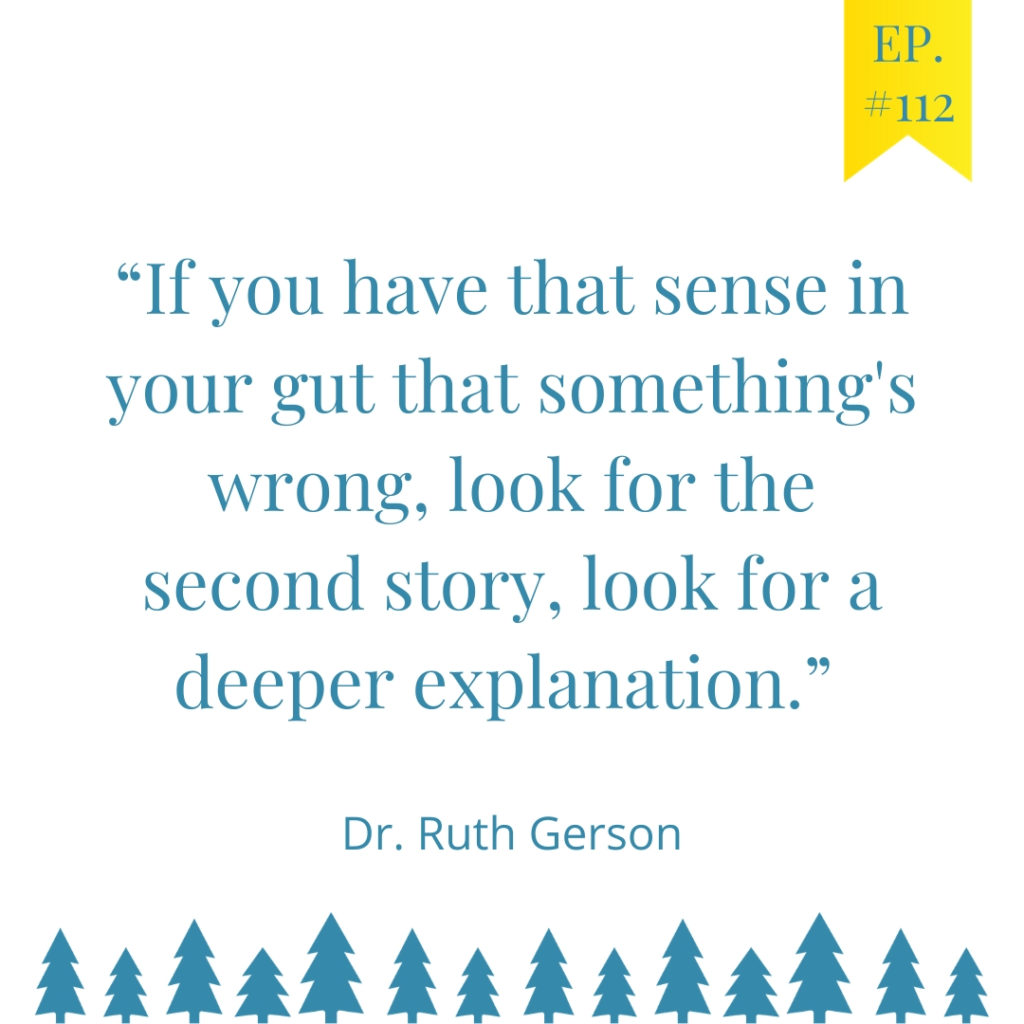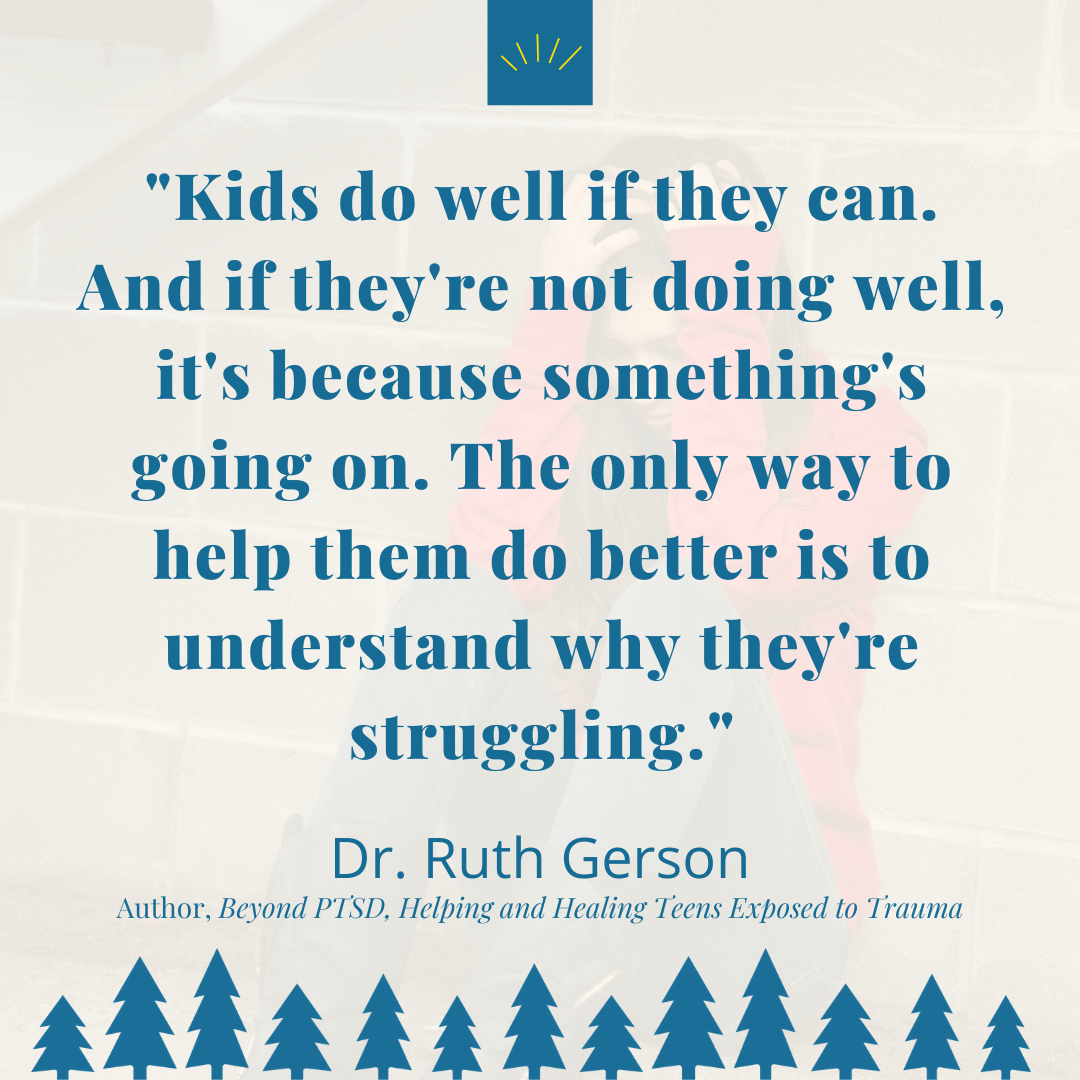Ep. 112: Helping Teens Exposed to Trauma
Sunshine Parenting - Un podcast de Audrey Monke

Catégories:
In this episode, I'm talking with Dr. Ruth Gerson, a child and adolescent psychiatrist at NYU's Langone Medical Center, about helping teens who have been exposed to trauma.
Trauma is, by definition, when an experience feels so threatening to one's safety and well-being that it overwhelms one's ability to cope. Human beings, especially children, are amazingly resilient. Not only can we humans survive terrible things, but often we commit incredible acts of strength and heroism in the face of adversity, such as the soldier who carries a wounded friend out of battle despite her own wounds, or a father who rescues his children from a raging fire. But just because we survive something does not mean we are not marked by the experience.
-Ruth Gerson, M.D., Beyond PTSD
Ruth's book, which she co-authored with Patrick Hepple, is Beyond PTSD, Helping and Healing Teens Exposed to Trauma. Ruth is a colleague of Dr. Jess Shatkin, who I interviewed back in Episode 16 about his book, Born to be Wild: Why Teens Take Risks, and How We Can Help Keep Them Safe.
Both Ruth's book and our conversation have opened my eyes to the prevalence of trauma and the importance of helping teens who have been exposed to trauma. Trauma can manifest in many different and unexpected ways. In most cases, our kids aren't even aware that it is past trauma that is causing them to feel or behave in certain ways.
Big Ideas
- Certain traumatic experiences are just too much for our brains and our bodies to take in.
- The structure of Dr. Gerson's book is set up so that you can read sections related to different behavioral issues, such as self-injury, risky behavior, substance use, school refusal, aggression, and many other topics.
- Trauma-informed care for kids is necessary for anyone who works with youth today. The goal of this book is to help people know how to look for, talk about, and find kids the right help following trauma.
- Some of the factors affecting kids response to trauma are:
- their developmental and emotional age/maturity level
- the context and support of their environment
- their previous experiences
- Behavior is communication. Watch out for any significant changes in a child, such as:
- temperament
- sleep and eating patterns
- showing an increased amount of anxiety or fear
- When a child discloses something that is difficult for them to share, make sure to give an appropriate response and not expressions of disbelief. Help the child to feel heard and safe.
Quotes
Audrey: "Oftentimes, we're very focused on teens' problematic behaviors when really the underlying thing that really needs to be addressed is something else and that is just how they're coping with this trauma."
Ruth: "A kid who experiences trauma over and over is going to be much more sensitive to something happening. It's kind of counter-intuitive and it's actually something that kids often say is they feel like, well I should be used to this or it shouldn't affect me anymore. And so it's a real point of education that we try to give to kids that just because you've been going through something forever, it doesn't make it easier."
Ruth: "But traumatic experiences, or things that push us beyond that (comfort zone) line and having that happen over and over again, are really detrimental. Not something that you can learn to grow from without help."
Audrey: "Even in adults, trauma can manifest decades later which is why I think it's so important, the work you're doing to help earlier when kids are having these symptoms."
Ruth: "I really encourage parents to trust their instincts. Parents know their kids better than anyone. We know their ins and outs. We know their tiniest habits. We know the littlest ticks and their littlest, funny tells that let us know what kind of mood they're in or whatever. So I really encourage parents to trust their gut."

Ruth: "You have to be able to take that step back and try to think from the kid's perspective what might be going on that would make them behave in this way. And that's hard because it does require putting aside how difficult that behavior is for you, the parent, to be on the receiving end of it. Just like it's really hard to be with a baby who won't stop crying. But the only way to solve the underlying problem is to try to step back from our own emotional reactions and try to take the kid's perspective."
Ruth: "We can still encourage our kids to be able to do the things that they need to do to be successful socially and to be successful in school and then as professionals. But if we just tell them to do it without understanding why they're struggling, we're not going to be successful."

Ruth: "There's a lot of shame and a lot of silence around trauma. So kids don't know that it's not their fault. They don't know that it's something that happens unfortunately to a lot of people and that they can speak up about may, can get help for it. And so they don't talk about it and they don't ask for what they need because of that shame and that pain that keeps them silent."
Ruth: "Because trauma can be such trigger for shame, particularly with things like sexual trauma or suicide, kids are made to feel like it was their fault. Kids take that initial reaction of disbelief as disbelief, right? They don't believe me. They don't think it's really happening. I should never talk about this again. And it can be really damaging."
Audrey: "Kids can be very resilient and work through things and we can help them with that by just being supportive and being caring, regardless of how awful it is."
Audrey: "When you can stay calm and not let them get to you, you're more effective with them. And I think in a lot of ways I feel like it's easier to do with other people's children than with your own."
About Dr. Ruth Gerson
Dr. Gerson is board certified in both general and child and adolescent psychiatry. Dr. Gerson received her bachelor of arts in Biochemistry at Harvard University and received her medical degree at Columbia University College of Physicians and Surgeons. She completed her internship and general psychiatry training at the Cambridge Health Alliance-Harvard Medical School residency program where she served administrative chief resident. Dr. Gerson completed her child and adolescent psychiatry training at the Child Study Center at NYULMC and Bellevue Hospital Center. She also completed a public psychiatry fellowship at NYULMC. Contact Dr. Gerson.
Books
 Related Posts & Podcasts
Related Posts & Podcasts
Ep. 111: Raising an Exceptional Child in a Conventional World
Ep. 16: Born to be Wild with Dr. Jess Shatkin
7 Ways to Help Kids Through their Teen Years
Helping Kids Through Their Low Point
Ep. 97: Parenting the Challenging Child
Ep. 100: Teens’ Advice for Raising Responsible, Independent Kids

